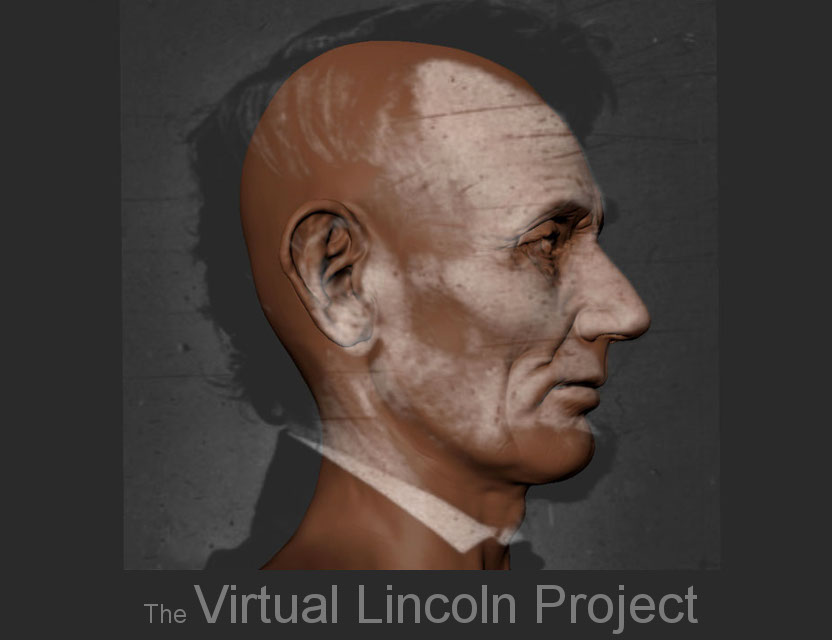Survival Guide: Career Tips
Advice For Upcoming and Recent Graduates

Portfolio Reviews
The Career Center can provide tips for improving your resume, but what they won't tell you is that as designers, your portfolio and demo reels are what will actually make you stand out and get a job. Ask the New Media faculty to take a look at websites, portfolios, or demo reels. Or post on Facebook and let your peers and alumni offer suggestions and strategies for producing the best work possible. They're happy to help.
- Other options involve career expos, online forums, and conventions where people can ask industry professionals and independent entrepreneurs questions.
- If possible, start selling work while in college, or submit to festivals and exhibitions. Set up a website or take a few commissions on the side of classes. It will help transition after college.
- It is also possible to talk to a talent recruiter. These agencies get paid dividends from companies based on how many of their recommendations get hired, so representatives are usually free to contact. The only catch is that you should have a reliable record, ok personality, and a very good portfolio prepared in advance.


Networking
In this day and age, online profiles often play a factor in getting hired. Getting your own portfolio website is ideal, but businesses also really love LinkedIn. It is currently the largest job recruiting site. Connect with the faculty and friends on LinkedIn. They can provide references and help you get a foot in the door to the job market.
- After graduating and saying goodbye to college, your chances to build connections with other like-minded designers will be limited to co-workers and professional acquaintances. Guilds and professional organizations charge membership dues, but they also provide workshops, resources, and a chance to meet with other creative people. A free alternative is to visit forums, industry news websites, or follow social media.


References
Lots of New Media people don't like showing off artwork or going to social events. That's perfectly understandable, but unfortunately society is kind of competetive and introverts are at a disadvantage when it comes to trying to get a job. Outgoing people who have references are statistically more likely to get hired than a person who doesn't have lots of connections in the industry, even if that person does have a lot of creative talent.
- Personality, confidence, and enthusiasm also factor into getting hired. If other people like you, they are more likely to recommend you. The best advice is that even though it really sucks, and you would rather stay home watching Adventure Time, making an attempt to awkwardly interact with other human beings will help out with career prospects in the long term.


Interviews
Employers in New Media fields aren't going to be impressed by a nice formal suit or the grades on your resume. They will want to see a strong portfolio of digital work, a variety of listed software skills, and a few years of experience or an internship. Being able to work quickly under pressure to meet deadlines is essential. In many cases, a good recomendation from someone in the industry is enough to secure an interview, even if you don't have all the desired skills or an amazing portfolio. As long as you can show that you are a team player and are creative and willing to work hard to learn new programs, you have a shot.
- Having a website and LinkedIn account isn't always enough to attract clients. The best way to get people to seek out your work is to start doing small freelance jobs or internships. These will build up a client base who can recommend you to more employers and opportunities
- Unsolicited cold call emails to companies are generally not the best way to bring attention to your work. Seek introductions and recommendations, go to conferences and film festivals, and leave a good impression when meeting a potential employer face to face.
- If you can't get an interview with anyone after trying for months, then ignore the previous tip. Send cold call emails, but do so as a last resort. Conduct research and direct emails inquiring about job positions or freelance work to the HR department director, or whoever is most relevant to the job type. Continue improving your portfolio, resume, and online presence

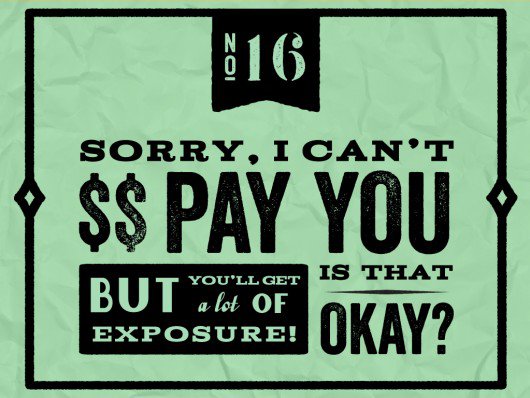
Never Work for Free
A lot of people will seek out college students offering a deal where if you work for them, they will help you build your resume and get references needed to break into the industry. However, they often won't pay you. This isn't necessarily because they are trying to take advantage of undergraduates. Most of these people are small business owners and independent developers working on shoestring budgets who simply can't afford to pay the same wages as studio productions.
- Most professional designers advise against giving your hard work away for nothing. It indicates you don't view your work as professional, and also undermines the entire freelancing profession that relies on clients understanding that services come with a pricetag. If one person works for nothing, than clients will expect other designers to work for cheap as well, which takes business away from struggling freelancers when people go to enlist free student labor instead of hiring the professional. Freelancing isn't free, so don't undersell yourself.
- Realistically, having freelancing experience and client references statistically increases your chances of finding employment, so we can't prescribe never taking an opportunity when it comes along. Even if you don't get paid, there are still smart ways to ensure you get something beneficial for your work
- Be wary of deals where you are offered a portion of the eventual profits. Most startups fail, and a 50% stake in a flopped product is nothing. Always get paid something upfront
- Walk away from any deal that doesn't credit your work. Just because you are an intern or undergraduate doesn't make your contribution any less valuable than any one else's
- Don't sign contracts without understanding the legal consequences. Be especially cautious when agreeing to give up the rights to your work. It is a standard practice for companies to force artists to surrender all distribution rights to the company, but you should still be able to negotiate to display select work on your portfolio or website

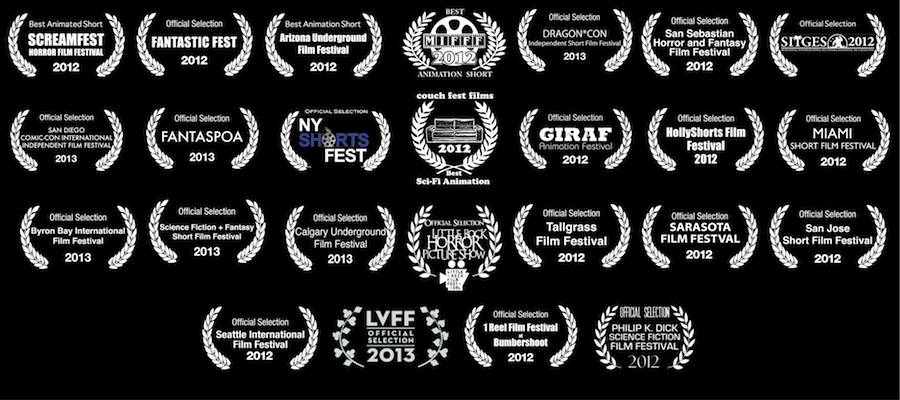
Submitting to Festivals
Animation and video students ideally want to have some recognition and awards attached to their student short videos and independent films. Unfortunately, film and animation festivals have very costly entry fees and travel expenses, not to mention tough competition. Most national and international winners have already been pre-screened and selected from eminent art schools, or the favored individuals have already collected on a number of awards in the lower film circuits. In other words, unless your short is really really mindbogglingly amazing, the likelihood of winning is very small.
- Judges are still obligated to at least view your submission to see if it meets the competition standards. If it makes the cut it can still get screened before a relatively large audience of critics and industry professionals, which is better than nothing.


Demo Reels and Portfolios
Focus on the area you are applying for. If you know you want to be a director, don't settle for Production Assistant internships in hopes of moving up the hierarchy. Get experience directing, even if it is on low-budget films or commercials. Walk cycles, facial animation, and movement studies should comprise the core of animator reels. Graphic designers should include branding on your resume and website, and filmmakers will want some awards and recognition attached to short films
- Always put your best work first. The first 10 seconds of a reel are the most important. For websites, the equivalent is generally a cover page or design that the viewer looks at first. Make sure your name and logo are prominent
- Include a variety of subjects to show versatility, but don't put in work you think might be mediocre just to have more content. Quality is better than quantity
- Keep reels and resumes concise. 1 page is the preferred length for resumes. 1-3 minutes is ok for a reel, but 5 minutes is probably pushing it for someone who hasn't been working in the industry for decades
- Update your sites and reels occasionally to reflect your most current projects and style of work
- Be mindful of what types of skills and projects will be in demand outside of college


Workflow
Businesses operate on tight schedules and deadlines. Time is money. Design isn't like art, where an artist can spend as much time as they need to to make a beautiful painting. Design has to be done fast, while still being economical and high-quality. If you like to work at a slow and steady pace, you're going to have a hard time in the design profession.
- So how fast should you be able to produce work? In general, your boss or client will want to see a number of quick concept ideas at the end of a week-two week period. They will offer suggestions for changes, and you will have some time to go back and revise things. The next time you meet you will present some cleaner versions for approval. After that, if they like what they see, whenever the deadline is is when you have to have everything presentable and complete.
- The design process doesn't sound too bad, until you realize that you may have multiple projects going on at the same time, and you have to prioritize working on which projects to spend more time on and which ones to spend less time on. No matter how much time is spent on each project, they all need to look professional or your client won't want to recommend your services again. This is where you really have to be good at doing something right the first time so you don't have to waste precious time editing or redoing a project.
- It may take some extra hours of unpaid overtime to get a job done on time or done well. Not all clients can afford to pay by the hour, so if you spend 500 hours on a project where you only earn a previously agreed upon $350, it doesn't take a great mathematician to figure out you aren't making back what you put in. If you can work quickly and do a job in half the amount of time without encountering any problems, you make a nice profit and have time to relax.
- In addition to working on project deadlines, you need to take time to search for leads and be lining up future jobs or clients so you have work once the current project is over. It's a never-ending cycle of rush-wait-rush-PANIC-wait-rush that can be quite stressful.


Transitioning after College
Graduating feels great. But then after a few weeks of celebratory sleeping in late and binge-watching Netflix all day, you come to the terrifying realization that you don't have the slightest clue how to promote your work and get hired. Your portfolio isn't that bad, but it isn't outstanding enough to secure your dream job. There aren't any New Media-related jobs in the area where you live. You don't have any connections in the industry, and all your job applications keep getting zero responses back.
- All the lovely equipment and software you used in college will no longer be free or student discount-priced. It's expensive, but necessary for the trade. Start building up your collection gradually when you can afford it. DIY equipment is also an option
- New technology advances make programs obsolete in just a few years, so keep up to date with what cutting edge tools the industry is using. Many companies use in-house software that you weren't taught in college, so you have to be willing to adapt and learn
- Continue to practice using software and equipment after college. Having a degree doesn't guarantee you a job, so don't stop making projects
- Expect to start small and work your way up. College graduates with a liberal arts B.A. don't immediately start out getting paid $$$$ designing logos for Coca-Cola, or as art directors at Pixar or directors of multimillion dollar movie productions. It takes several years working for companies and clients nobody has heard of before you start to build credentials and develop a respectable portfolio

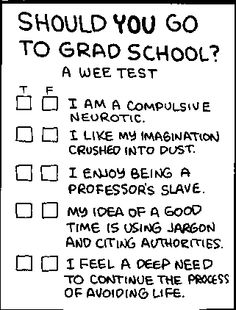
Grad School?
Most employers in the industry don't seem to care if you have a degree from a prestigious university or not. A Masters degree in Art, Graphic Design, or Film Studies isn't like a business degree or a Ph.D. in Physics. It's truly not going to help you climb any corporate ladders or determine whether you become a director or art director over somebody else. Experience, talent, and being able to get along with others are what really matters in the trade.
- Basic internet research indicates most art and design universities have some top notch professors and facilities, with relatively small class sizes and post-grad support. Unfortunately the top schools that are worth going to are all insanely expensive, out of state, and difficult to get admitted to. These universities are also going to make you work a lot if you want to improve, so say goodbye to sleeping ever again. Getting a job afterwards is not guaranteed even with a degree from one of the best schools, so be cautious about racking up additional debt.
- If you think you can improve your skills in Grad School, then it might be worth it. Attending can't really hurt your career chances, just your savings account. Most Masters Degree Programs require students to write a thesis paper or create a portfolio piece, so be prepared for that.
- A lot of people go to grad school just to avoid the alternative of having to get a lousy post-grad job. It's really a personal decision if you want to go or not, so ask your friends, significant others, or the faculty for their suggestions.

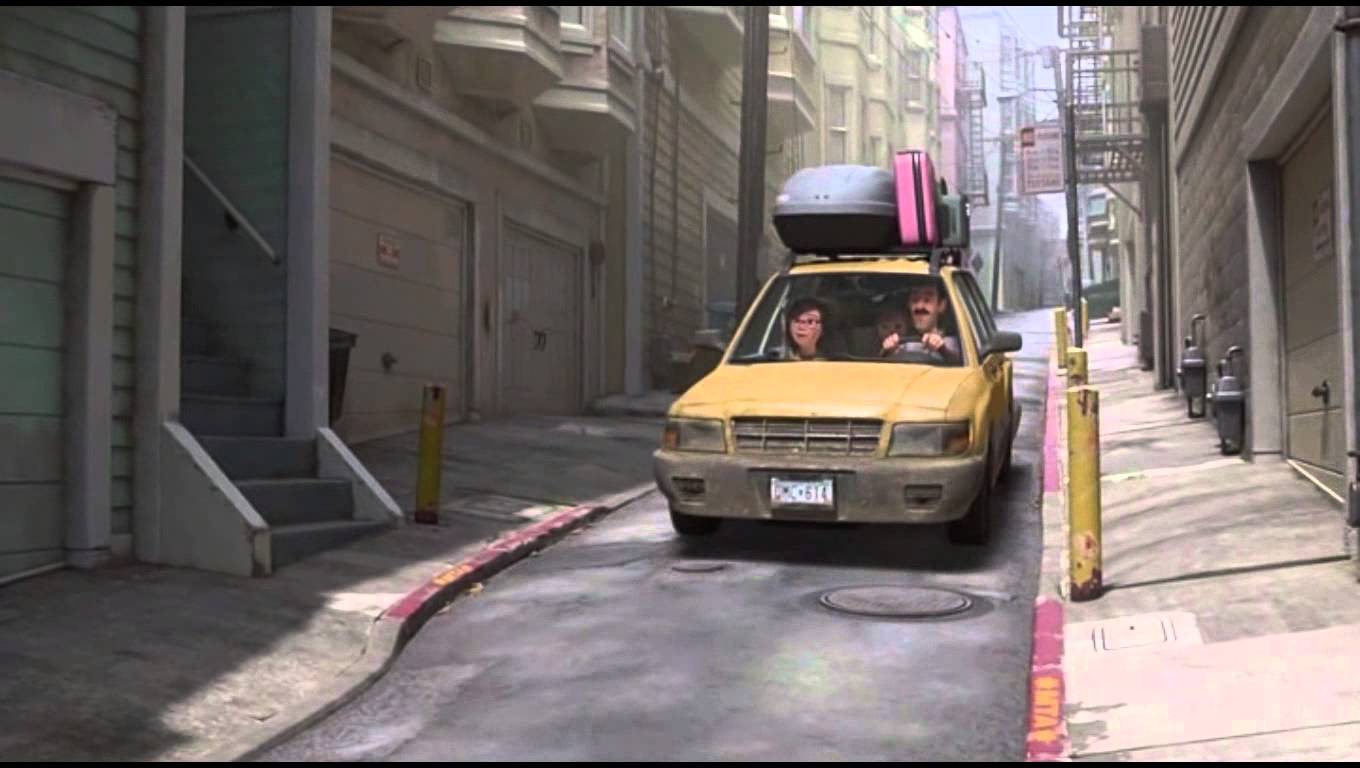
Location Matters
North Carolina is not exactly a bustling hub for new media careers. There are a few big studios in the Raleigh-Charlotte area, but overall there aren't a lot of job opportunities for you if you stay here. Most businesses have settled on the West Coast or in big city areas.
- If you're ok with working on small scale jobs that you enjoy rather than industry jobs, you might be ok doing freelance stuff. But if you want to make a big break, it is recommended going where there is money and a demand for your skills.
- Moving away really sucks, especially when you're already broke and needing a job and a place to stay. You're going to need to plan ahead and do research, save up money somehow, and try to establish some contacts in the place you plan on moving to.
- Realize that moving to a better location still doesn't guarantee you will get the job you want. Companies are highly competitive, and there are lots of other recent graduates just like you trying to get those entry-level jobs. Have some back-up options.


Collaborations
Unless you have relatives in the industry, you're probably not going to know many other designers, animators, or filmmakers immediately after college. That makes it hard to find clients. Collaborations and partnerships are a common way of getting both your names out there. It's also a lot easier than trying to start out alone.
- Collaborations don't tend to last forever, even with best friends. Eventually, once you have both built up some portfolio work and attained a degree of financial security and confidence, you'll probably want to go separate ways to pursue other projects or interests.
- Never attempt to screw over a business partner. Create a clear business contract that divides things up equally and both parties understand
- When just starting out, if there's only two of you generally someone is going to have to handle more of the promotional, contacts, and business aspects while the other handles meeting client demands. You can alternate turns, but collaborations tend to work better when specializing in different areas.
- Most creative people don't really enjoy boring paperwork, management, and marketing, so this is just a heads up that freelancing involves a lot of that unglamorous stuff. You'll also have to file independent business taxes to the government if operating a legitimate company. If you know any business or accounting majors, they might be able to provide some tips to keep you from banging your head against the wall.
- Try to part on friendly terms. It's never a good idea to burn too many bridges or alienate people. If you get along with someone, you can always work together on another project in the future. If you don't want to work with that person ever again, well, it's kind of self-explanatory


Workplaces
Whether working from home or in a studio setting, the atmosphere of the workplace environment affects productivity and morale. You don't want to get trapped in a cubicle farm or corporate sweatshop for the next several years. To find the best fit for you, research the different types of workplaces and see who the executives are. Small studios tend to be a lot more relaxed than corporate firms, but they are generally less organized, understaffed, and have less resources and equipment to work with. Industry workplaces can be very stressful due to the miserable deadlines and unforgiving work schedules.
- In general, corporate studios that have to follow the oversight of a board of executives or stockholders are less ideal for independent minded people who want to have total creative freedom over their work. Every company has its own style and branding guidelines that designers and artists are expected to conform to. Reviews and revisions are a daily norm.
- The most important factor to consider isn't the salary, time off, or retirement and healthcare benefits, even though those are very relevant things. Finding good coworkers, bosses/directors, and clients will make your life so much easier.

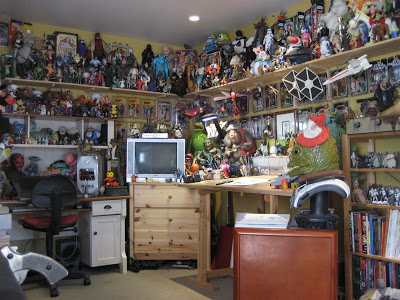
A Typical Home Studio. Ben Balistreri
Working from HomeNothing beats staying home all day and not having to deal with evil bosses or that one obnoxious coworker who won't stay in their designated prison cube. However, if you plan on paying the bills you still have to stay productive. A lot of people who work from home struggle with being motivated to wake up every morning at 8:00 to do the daily rounds of promoting work online, managing finances, contacting clients, and meeting set deadlines for when certain things have to be done.
- Freelancing is not easy. You have to spend a large chunk of time every week promoting yourself and trying to attract new clients. Some clients will be horrible to work with, and others will try to pay you less because you're unexperienced. Never work for free, unless it's something for your mom or best friend.
- Even if you do manage to build up a list of clientele, it's still not possible to make a living solely by commissions. There are too many long gaps without any work, followed by stressful times when there are too many jobs at once. You need to find another primary source of steady income
- Work areas should be set up to suit your style, whether it be neat and organized or cluttered with tools and inspirational stuff. Having lots of distractions around may interfere with how much time you spend working on commissions if you end up surfing the web instead. Sticking to a schedule is recommended, but as your own boss, you get to decide what to do with your own time.


Clients
Unlike the pipeline production jobs found in animation and film studios, most designers work solo. Collaboration projects and full-time advertising jobs aren't uncommon, but they are usually only short-term. Designers are constantly moving on to new projects, and rely heavily on freelance commissions and references from past clients. Unfortunately, what this means is that a large part of being a successful designer is not just having a good eye for design, but also sitting down and sending out calls and emails seeking out potential clients. Knowing how to communicate with clients face to face and standing by payment deadlines is essential to running a small business effectively.
- Balance your workload. Don't take on more commissons than you can manage. Sometimes that means you have to turn down a high-paying contract or awesome job offer to honor completing a previous agreement. There will be other opportunities
- Know when to say no to clients. Some jobs will just end up getting drawn out and wasting your time. You can always walk away from a deal that goes way over schedule. You don't owe the client anything more than you agreed upon, and if the client tries to pressure you or make you feel guilty for quitting on them now, they are probably the ones who have broken the terms of the arrangement, not you.
Roberto Blake: How to get paid as a Freelancer
Lynda.com: Invoicing and getting paid


Director Francis Ford Coppola on the set of Apocalypse Now
Working in the IndustryShould you choose to go into the cutthroat television or movie industries, be prepared for what exactly you are getting into. Studio executives and directors clash all the time over creative control of the production. Oftentimes directors are forced to make unwanted editing concessions due to budget cuts, important staff members leaving or being fired, censorship, mass appeal, or better ratings.
- The production crews and art departments also frequently suffer under overcontrolling egomaniacal directors. People can be fired just because they disagree with one thing that the higher-ups don't like. Even actors can have meltdowns or treat crew members with contempt. The technical crews and special effects artists have remained at the bottom of the production hierarchy due to the longstanding tradition of anti-unionization in the entertainment business and they are unfortunately usually the ones who have to deal with the worst workplace abuse. Artists and camerapeople can easily be replaced without setting back a production schedule, so they can't really complain about long unpaid hours without fear of being laid off or blacklisted from other gigs. Non-disclosure agreements and contracts keep them from speaking out on social media, and overall it is just a really unpleasant situation.
- It's not really possible to predict in advance if a production is going to turn out to be a total nightmare or something amazing that you will deeply regret not getting involved in when you had a chance. Just stay informed as much as possible, and try to avoid getting involved with directors or studios that have a reputation for mistreating their subordinates (it's usually the ones you haven't heard much about that end up being the most unpredictable).
- The majority of the industry is comprised of a whole lot of very nice creative talented people who are usually willing to help out and collaborate, and working in the trade can be extremely rewarding. There's always the option to keep struggling making small independent films or boring commercials that pay bills but offer little creative satisfaction, but if an opportunity to work on an interesting production comes along, it might be worth taking the risk.
Dorkly: Sausage Party Production Problems
Hollywood Reporter: Brenda Chapman on Being Replaced as Director of 'Brave'
Slashfilm: Peter Jackson Reveals Production Problems on the Hobbit trilogy
CinemaBlend: Joss Whedon reveals pressures behind the scenes of The Avengers: Age of Ultron
The Guardian: Silver screen to small screen: why film directors are taking over TV








